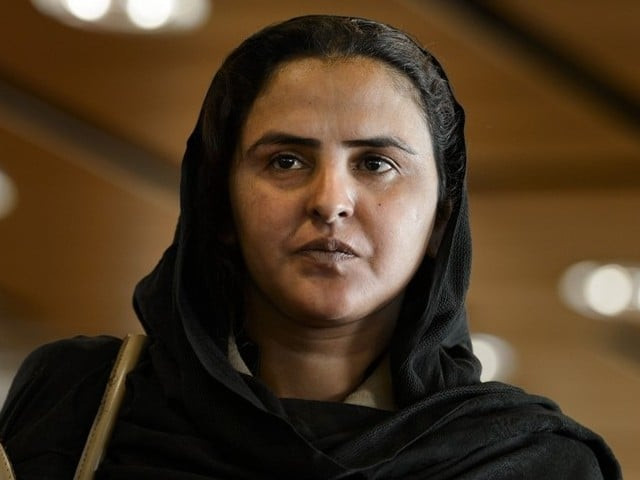Supreme Court seeks complete record of Mukhtaran Mai rape case
Mai was gang-raped in 2002 on orders of a local jirga in retaliation of a minor offense committed by her brother

Supreme Court seeks complete record of Mukhtaran Mai rape case
After the passage of more than three years, a three-judge bench of the apex court, headed by Justice Mian Saqib Nisar, took up Mai’s review petition against the trial court's April 21, 2011, verdict regarding the acquittal of the accused.
During the hearing, Barrister Aitzaz Ahsan stated that certain errors were made in the court’s judgment and he would prove it through evidence.
He added that there were nine pieces of evidence, which were not taken into account by the court in it's judgment.
The bench, however, said that the record has been sent back to the trial court. The apex court then summoned the entire record of the case and adjourned the hearing for an indefinite period.
On April 21, 2011, a three-member bench of the Supreme Court upheld the verdict of the Lahore High Court (LHC) in Mai's gang-rape case and acquitted five of the six accused and dismissed the petitions. Mai on May 19, 2011, filed a review petition in the Supreme Court against the verdict.
In 2002, Mai was gang-raped on orders of a local jirga in retaliation of a minor offense committed by her brother; for nine years she braved death threats to bring her attackers to justice.
Initially, 14 accused were nominated in the case, out of which eight were acquitted, while the remaining six were given death sentences by the trial court. Later, the LHC acquitted five of them and converted the death sentence of one of the accused to a life term. After this, the Supreme Court took suo motu notice while the victim and accused Abdul Khaliq also filed petitions in the apex court.
Currently, in her review petition, filed through her counsel Barrister Aitzaz Ahsan under Article 188 of the Constitution read with Order XXVI, Rule 1 of the Rules of the Supreme Court, 1980, she has pleaded that the court review and recall the judgment under review in the interest of justice and grant relief to Mai as prayed in the titled criminal appeal.
Mai has also requested the court to constitute a larger bench to hear her review petition, contending that she is aggrieved of and dissatisfied with the findings of the court, whereby the aforesaid appeal was dismissed and judgment passed by LHC's Multan bench upheld.
“The findings, reasons and considerations of this court that led to the conclusion as stated herein before are based on erroneous assumptions of material facts and misreading of the record and without adverting to the very pertinent points of law raised and agitated before this Court,” Mai has contended, adding that these errors are manifest and apparent on the face of the record. “These errors have resulted in a grave miscarriage of justice,” she said.
Explaining her decision to file review petition, the rape victim has contended that, at the outset, before adverting to the actual instances of misreading of the record by the learned majority, it may be pointed out that looking at the facts and circumstances of this case, and in the appreciation of the evidence on record, the learned judges had misapplied the principles relating to appeals against acquittal.
“There are distinct rules of evidence exclusive to the offence of rape,” Mai said, adding that these principles have been devised over generations of learned and compassionate judges aware of the prevalence of unreported cases, the inhibitions and impediments to the reporting of such crimes violating the personal honor of the more vulnerable gender (often targeted in revenge), the hyper-sensitivity of the situation of the victim and her family and the fact that she will, in most cases, be the only witness to the actual crime.
“What has to be understood, at the outset, therefore, is that in rape cases the victim’s own statement is the crucial litmus test for the outcome of the case,” she submitted.
Her counsel Barrister Ahsan submitted that if she is found credible and a person of good character and deeds, her testimony alone, without more and without requirement of any corroboration, would be sufficient to sustain a conviction.
Barrister Aitzaz contended that “in addition to whatever has been stated herein before, some of the legal findings and conclusions based thereon of the majority judges are not sustainable and contrary to the settled law; hence they are liable to be reviewed.”
He further submitted that Hazoor Bakhsh and Ghulam Hussain, being close relatives of the petitioner-complainant, could not pass the test of independent witnesses; therefore, the recovery of the pistol should be disbelieved. “Such a finding is against the settled law that a ‘factum of recovery’ cannot be ignored simply because the witness of memo of recovery is related to the victim,” Ahsan contended.
He submitted that the majority judges had upset the settled law by holding that even where a prosecution witness is not produced, his or her statement recorded under Section 164 of the CrPC could still be used and that too under Section 172 (2) of the CrPC and that inference could be drawn from it for the purposes, or under Article 129(g) of the Qanoon-e-Shahadat Order, 1984.
“The observation of majority judges that suggestions during cross-examination could be considered against the accused only if he/she had taken a statutory defence is contrary to the settled law on this point, especially when there is no ‘statutory defence’ to the offence of rape”, Aitzaz said.
The learned counsel contended that the facts stated by complainant that holding of the ‘panchayat’ were ‘hearsay’ goes against the settled principle that all facts, whether seen or perceived, would be stated in the court as direct evidence of the event.



















COMMENTS
Comments are moderated and generally will be posted if they are on-topic and not abusive.
For more information, please see our Comments FAQ